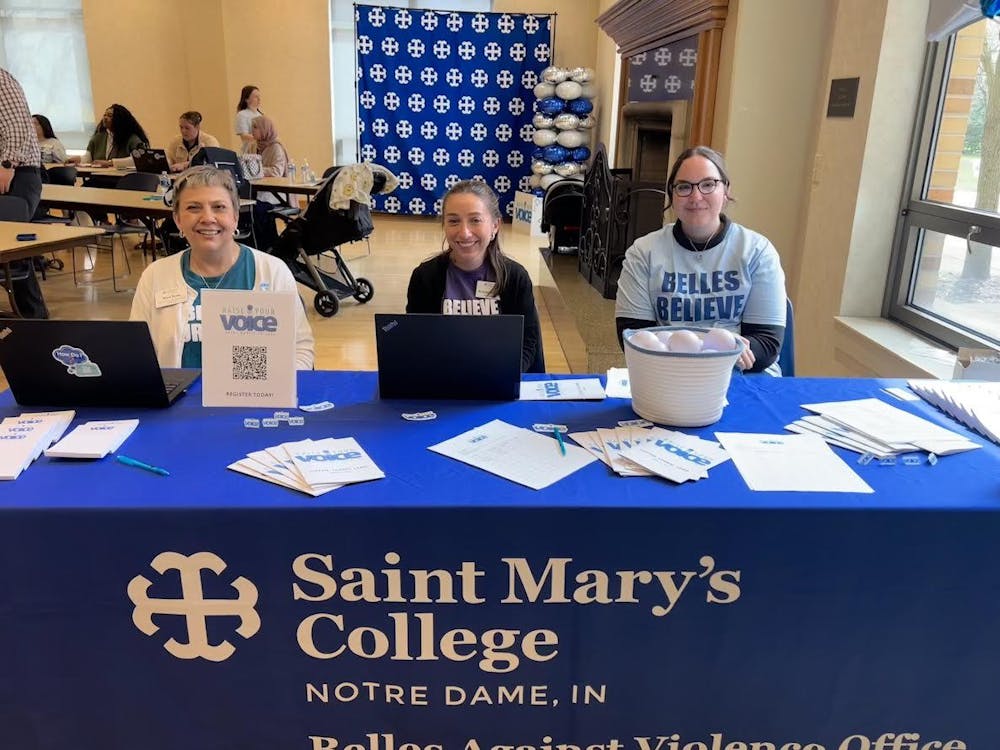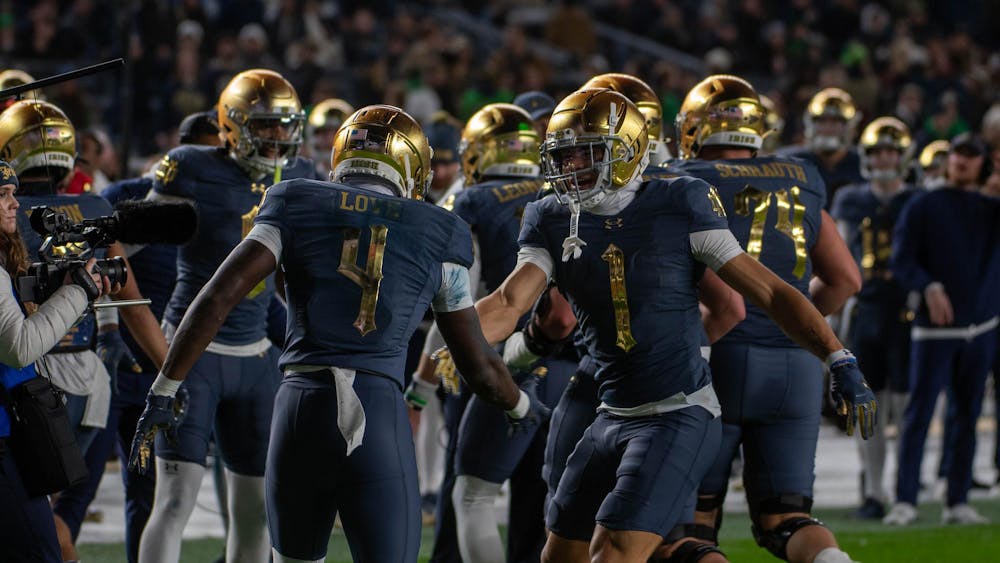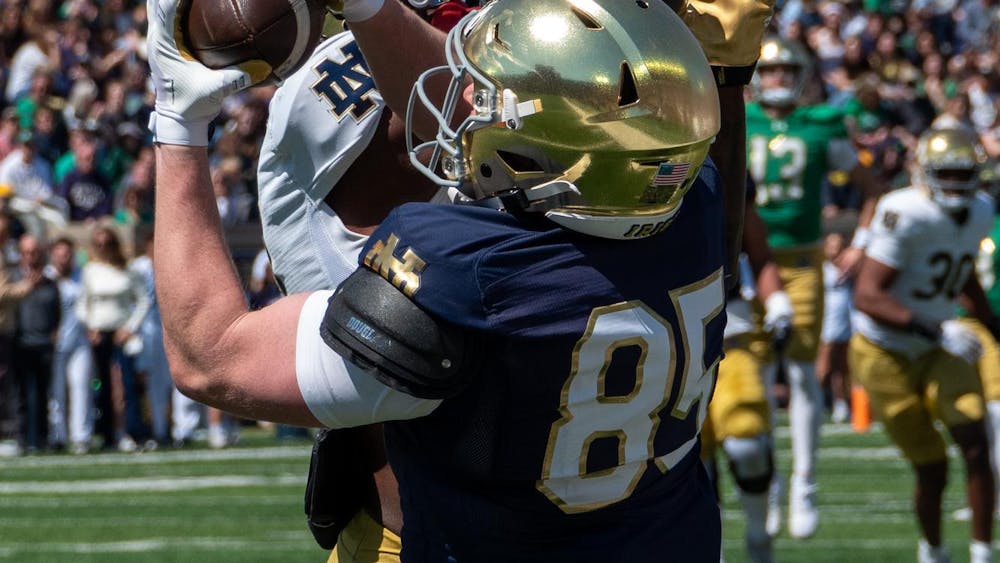“The Hunting Ground,” a 2015 film that addresses sexual assault on college campuses in the United States, was shown in Rice Commons at 5 p.m. Sunday and at 11 a.m. Monday. The film was shown as part of the Raise Your Voice Symposium.
Grace Maher, associate director of alumnae relations at Saint Mary’s College, shared about the importance of the event and its connection to the student community.
“This is the fourth year of the Raise Your Voice Symposium, which was started in 2021 as a response to campus tension related to an article printed about explicit accounts of harassment of Saint Mary's students,” Maher said. “Saint Mary's knew they needed to do more to support the community, and so Raise Your Voice was born.”
While the symposium started in 2021, Saint Mary's has been playing the film since it came out.
“I really admire the bravery that Saint Mary’s College has in allowing us to continue to screen this film,” Liz Baumann, the title IX officer at Saint Mary's, said. “We first screened it 10 years ago when it first came out.”
When Saint Mary’s held that screening 10 years ago, Andrea Pino-Silva, who is featured in the documentary, was present. Pino-Silva is a civil rights activist and public scholar who in the past has discussed issues regarding gender and violence.
“We’re one of the only college campuses in the film that actually show it and embraced it, rather than shying away from it,” Baumann said. “I think that says a lot about who we are as a community where we will acknowledge our faults and want to continue to be better.”
Maher shared that the purpose of the screening was to provide context for a keynote address delivered later by Pino-Silva in Carroll Auditorium at 6 p.m. Maher also stated that the screening was held to honor the film's 10-year anniversary and to ”Acknowledge the role that Saint Mary's and Notre Dame play in the film.”
Student Ally Krause discussed how the documentary provides a realistic perspective that connects with students.
“This documentary features the personal stories of several students, including those from Saint Mary’s College, as well as our keynote speaker, Andrea Pino-Siva, who briefly shared their experiences of sexual violence, and the lack of justice that followed,” Krause said.
“This documentary covers a very real issue that plagues colleges and universities across the country, and does so in a way that invites conversation about how to create a safer campus community,” Maher said. “Audiences typically find the content difficult to engage with, obviously this is a topic that can be hard to interact with or address, however most also find the film critical to view and discuss.”
Freshman Hannah Walsh, who watched the film, felt that the documentary shaped her own perspective on sexual assault.
“After participating in Take Back the Night last week, my heart felt heavy for student survivors prior to the screening," Walsh said. "After the screening, I feel the same, but even more informed and enraged about the college industry that is complicit in silencing survivors. I took away many anecdotes from this film, but I also took away many tips to be a better ally.”
The film publicized numerous statistics on sexual violence within college campuses. According to the documentary, more than 16% of college women are sexually assaulted while in college.
In addition to these statistics, publications such as the South Bend Tribune stated “there were only eight reported [sexual assaults] in 2010, 2011 and 2012 combined” at the University of Notre Dame. In 2015, Lieutenant Pat Cottrell, retired Notre Dame Security Police, was reported saying in the documentary that “they prefer to have the crime stats as low as possible.”
Caroline Heldman, associate professor at Occidental College, provided a number of notable points in the documentary.
“They protect perpetrators across the board because they have a financial incentive to do so,” Heldman said. "Perpetrators who are found responsible for rape are much more likely to sue institutions than survivors are, and institutions like to avoid lawsuits … they pretty much do whatever they can to give them a slap on the wrist.”
In an email, Maher shared that this information left an impression on her.
“Something that always sticks with me is the list of 'punishments' students who commit acts of sexual violence face,” Maher wrote. “It ranges from a $20 fine to suspension that takes place over the summer vacation. This response by various colleges and universities proves how much work still needs to be done because this not only cannot grant true justice to victims, but it also does nothing to discourage these acts of violence.”
Baumann shared how Saint Mary's documentary screening helps to facilitate conversations over acts of violence.
“It’s been a priority for Saint Mary’s to continue to talk about "The Hunting Ground," [what] we could have done better back then, what we have done better since then and what we can still do better,” Baumann said. “We hope audience members take away from this experience as a whole that there is always work to be done, and that we all play a role in creating a safer campus community. This is a truly national issue, and Saint Mary's strives to be a leader in creating a culture that provides safety for all students and community members, and that actively seeks to combat the issue of sexual violence.”
This sentiment was also similarly shared by students like Walsh.
“I hope the community who watches “The Hunting Ground” understands that they are not alone and that they have already made progress by watching this film, educating themselves and joining the conversation,” Walsh said.










